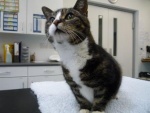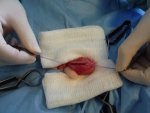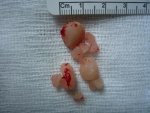FLUTD is the name used for a collection of common conditions affecting the cat’s bladder and/or urethra. The urethra is the narrow tube which carries urine from the bladder to the outside. Included in this description is cystitis (inflammation of the bladder).
The signs shown by cats with FLUTD are often similar regardless of the cause.
Clinical signs
- Difficulty, pain or crying when passing urine
- Passing urine more frequently
- Passing only small amounts of urine
- Passing urine in inappropriate places
- Straining before, during and after urination
- Passing bloody urine
- Behavioural changes and/or aggression
- Inability to pass urine
- Increased grooming of the hind end, possibly due to pain in that area
Most commonly FLUTD is seen in middle aged and overweight cats although it can occur in cats of any age. Both male and female cats are prone, however neutered cats are more susceptible, with males having a greater risk of complete urinary tract blockage.
Causes of FLUTD
There are many causes including:
- Urinary stones or crystals forming in the urine which then irritate the bladder lining
- Urethral plugs that form in the male cat’s urethra causing a blockage
- Muscle spasm in the wall of the urethra
- Abnormalities in the structure of the urinary tract
- Stress and behavioural issues
- Cancer of the bladder or urethra
- Disease affecting the nerves controlling the bladder
- Bacterial or viral infections
- Certain cheaper varieties of pet foods may increase the chance of developing FLUTD in susceptible cats
Diagnosis
We need to investigate all potential causes of FLUTD. This is important to ensure that the most appropriate treatment is provided. In 60-70% of cases seen it is not possible to find an underlying cause and this is called Feline Idiopathic Cystitis (FIC). Your veterinary surgeon will require a thorough history to establish which signs your cat is displaying and when they are occurring. A full examination is then performed, where your cat’s bladder and other organs are checked. Bloods are usually taken to check for diseases such as kidney disease and diabetes. A urine sample is then collected to examine its concentration, acidity and the presence of crystals, protein, red and white bloods cells and bacteria (infection). Once the veterinary surgeon has these results, treatment can usually be started but if the clinical signs reoccur or there is no improvement, further investigations will be required.
The next step usually involves X-rays or an ultrasound scan to assess the bladder, urethra and kidneys to try and locate the exact site of the problem.
Treatment of FLUTD
Depending on the underlying cause, treatment can vary considerably.
Feline Idiopathic Cystitis (FIC)
Once all other potential causes have been excluded a diagnosis of FIC is made. Cats make frequent attempts to urinate, often with blood in their urine due to bladder discomfort unfortunately with no medical cause. It can be a painful condition and once treated, measures should be undertaken to prevent a recurrence once the problem has resolved. Stress is an extremely important flare factor in FIC and can be anything from an environmental change to a new cat moving in to the street. See below for reducing stress and also Feline House Soiling. Veterinary recommended supplements are also available to help repair the lining of the irritated bladder wall and relax your cat.
Bacterial infection
This will be treated with a course of antibiotics. Usually repeat urine samples will be requested to check that the infection has cleared before stopping the antibiotics.
Urinary crystals or stones
If these are found to be present in your cat’s urine, a change in your cat’s diet will be required usually to a prescription diet which will be able to dissolve them. If bladder stones have formed from the crystals joining together, then surgery may be required to remove them as they may be too large to dissolve. The diet can be fed long term if required to help prevent the problem from recurring again.



Muppet presented to us with blood in his urine and a history of straining to urinate. After an investigation which included a urine sample, an X-Ray and an exploratory laparotomy, Muppet was found to have 11 substantial bladder stones. An incision was made into his bladder and the stones removed. He made a full recovery and is maintained on a prescription urinary diet to prevent the problem from recurring again.
Urethral obstruction
This is a life threatening medical emergency. A blockage of the urethra means the cat is unable to pass urine causing it to back up to the kidneys severely affecting their function. This very quickly leads to collapse and eventually death if left untreated. Once diagnosed, the blockage will be treated immediately usually under anaesthesia and your cat will remain in hospital for several days depending on the severity.
Reducing stress
Stress is a very important ‘flare factor’ which owners often overlook in treating a cat with FLUTD or FIC. Changes in diet, environment and weather, for example snow making your cat unwilling to urinate outside with no provision of a tray indoors, overcrowding, bullying, owner stress and new additions to the household are all triggers which can cause a flare up of FLUTD to a cat prone to the disease.
Stress associated with urination, for example cat owners who do not allow their cat to have a litter tray in the house, an unsuitable position for the litter tray (ie, in a noisy or busy part of the house) or even unsuitable litter in the tray are all factors that should be considered when caring for your cat. Also competition for the tray itself in a multi cat household should also be considered and more than one litter tray provided.
Pheromone treatment can often be helpful. Feliway is a synthetic copy of the facial pheromone used by cats to mark their territory as safe and secure. Feliway creates a state of familiarity and security in the cat’s local environment. This pheromone has been proved to provide comfort to adult cats in stressful times.
Zylkene is derived from a milk protein which has a similar post prandial calming effect that you would see in a kitten after it has received a milk feed from its mother.
Royal Canin manufacture a 'Calm' diet which can be used as a support for behavioural therapy. The diet contains active ingredients alpha-easozepine and l-tryptophan (a serotonin precursor that helps to support a relaxed mood) which are proved to be beneficial in anxiety disorders. Prebiotics are also included to help encourage friendly bacteria in the gut to reduce stress diarrhoea. Other supplements containing similar nutrients may also be recommended.
Your local branch of Cinque Ports Vets can offer advice on how best to reduce your cat’s stress so please feel free to ask for any information.
Other recommendations
Increasing your cat’s water consumption to help dilute the urine can help. This can be done by adding in some wet food to the diet and making sure your cat has free access to water. Water fountains can be useful for encouraging your cat to drink as they constantly move and recycle the water making it more appealing to your cat.
Some varieties of cheaper pet foods, may increase the chance of developing FLUTD in susceptible cats.
Ideally a high quality pet food should be fed which actively promotes urinary tract health by keeping the pH of the urine less acidic. We would recommend the Royal Canin Feline Vetcare range as this food has been developed to have an S/O Index which indicates that the food helps provide an environment unfavourable to the development of struvite and calcium oxalate crystals.
Controlled weight loss is also important as well as increasing exercise to help with long term control.
Most cats with FLUTD lead a relatively normal life as long as appropriate lifestyle changes and sometimes treatment are implemented. Depending on the individual case your cat may be prone to occasional recurrences.




